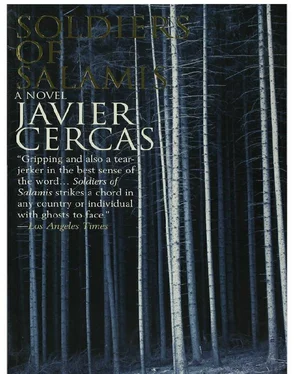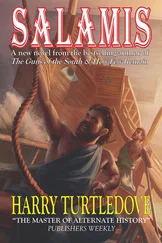'Damn the old guy,' muttered Bolaiño, his voice self-absorbed and sardonic. 'He still remembers.'
'What's it mean?'
'The Stockton thing?'
'What else?'
After a long pause Bolaiño answered my question with another question:
'Have you seen Fat City?' I said I had. 'Miralles really liked movies.' Bolaiño went on. 'He'd watch them on the TV he had set up under the awning of his trailer; sometimes he'd go into Castelldefells and in one afternoon he'd watch three movies in a row, everything that was playing, he didn't care what was on. I usually took advantage of my few days off to go to Barcelona, but one time I ran into him on the seafront in Castelldefells, we went to have an horchata together and then he suggested I come to the pictures with him; since I didn't have anything better to do, I went with him. It might seem incredible that in a holiday resort town they'd be showing a John Huston film, but these things happened back then. Do you know what Fat City means? Something like "city of opportunities", or "fantastic city" or, even better, "some city!" Well, some sarcasm! Because Stockton, the city in the movie, is an atrocious city, where there aren't any opportunities for anybody no opportunities except for failure, that is. For the most absolute and total failure, really. It's strange: almost all boxing movies are about the rise and fall of the protagonist, about how they attain success and then they fail and are forgotten; not here. In Fat City neither of the protagonists an old boxer and a young boxer even glimpse the possibility of success, nor do any of those around them; like that old washed-up Mexican boxer, I don't know if you remember the one, he pisses blood before going into the ring, and enters and leaves the stadium alone, almost in darkness. Anyway, so that night, after the movie, we went to a bar, and ordered beer sitting at the bar and we were there talking and drinking until very late, facing a big mirror which reflected us and the bar, just like the two Stockton boxers at the end of Fat City, I think it was probably both the coincidence and the beer that made Miralles say at some point that we were going to end up the same, defeated and alone and punch-drunk in a dead-end city, pissing blood before going into the ring to fight to the death against our own shadows in an empty stadium. Miralles didn't say that, obviously, the words are mine, but he said something very similar. That night we laughed a lot and when we got back to the campsite it was practically daybreak, everyone was sleeping and the bar was closed, and we kept talking and laughing in that loose way that people laugh at funerals — or places like that, you know and when we had said goodnight and I was going to my tent, stumbling along in the dark, Miralles called me and I turned and saw him: fat and lit by the pale light from a lamp-post, standing straight with his fist raised, and before his repressed laughter burst out again, I heard him whisper in the slumbering darkness of the campsite: quot;Bolaiño, see you in Stockton!" And from that day on, every time we said goodbye, whether it was until the next day or the next summer, Miralles always added: "See you in Stockton!"
We were left in silence. I suppose Bolaiño was waiting for some sort of comment from me; I couldn't say anything, because I was crying.
'Anyway,' said Bolaiño. 'What do you think you'll do now?'
'Fan-fucking-tastic!' shouted Conchi when I told her the news. 'I knew Bolaiño would convince you! When do we leave?'
'We're not both going,' I said, thinking Conchi's presence might make the interview with Miralles easier to get. 'I'm going on my own.'
'Don't be silly! Tomorrow morning we'll get in the car and we'll be in Dijon in a jiffy.'
'I've already made up my mind,' I insisted emphatically, thinking that a trip to Dijon in Conchi's Volkswagen was riskier than Leclerc's column's march from the Maghreb to Chad. 'I'm going by train.'
So on Saturday evening I said goodbye to Conchi at the station ('Give Señor Miralles my regards', she said. 'He's called Miralles, Conchi,' I corrected her. 'Just Miralles'), and boarded a train to Dijon like someone boarding a train to Stockton. It was a sleeper, a night train, and I remember being in the restaurant car, with its springy leather seats and windows licked by the speed of the night, until very late, drinking and smoking and thinking about Miralles; at five in the morning, dishevelled, thirsty and sleepy, I stepped down into Dijon's underground and after walking along the deserted platforms illuminated by globes of weak light, I took a taxi that dropped me off at the Victor Hugo, a little family-run hotel on the rue des Fleurs, not far from the city centre. I went up to my room, took a long drink of water from the tap, had a shower and lay down on the bed. In vain I tried to sleep. I thought about Miralles, whom I'd soon see, and about Sánchez Mazas, whom I'd never see; I thought about their one hypothetical encounter, sixty years earlier, almost a thousand kilometres from there, in the rain one violent morning in the forest; I thought I'd soon know if Miralles were the soldier of Líster's who spared Sánchez Mazas, and also what he'd thought as he looked him in the eye, and why he spared him, and that then perhaps I'd finally understand an essential secret. I thought all this and, while I thought, I started to hear the first sounds of the morning (footsteps in the hallway, the trill of a bird, a car's revving motor) and sense the dawn pushing against the window's shutters.
I got up, opened the window and the shutters: the uncertain light of the morning sun shone on a garden with orange trees and a quiet street lined by houses with sloping tiled roofs; only the birds' chirping broke the village-like silence. I got dressed and had breakfast in the hotel dining room; then, since I thought it was too early to go to the Nimpheas Residential Home, I decided to go for a walk. I'd never been to Dijon before, and not four hours earlier, as the taxi had crossed the streets which were lined with buildings like corpses of prehistoric animals, I had looked sleepily at its stately façades and bright blinking advertisements, and it had struck me as one of those imposing medieval cities that become ghostly at night and only then show their true face, the rotted skeleton of their former might; now, on the other hand, as soon as I got out onto the rue des Fleurs and, turning down rue des Roses and rue Desvoges, arrived at Place D'Arcy which at that hour teemed with cars circling the Arc de Triomphe — it struck me as one of those sad provincial French cities where Simenon's sad husbands commit their sad crimes, a cheerless city with no future, just like Stockton. Although it was cool and the sun barely shone, I sat on the terrace of a bar, in Place Grangier, and had a Coca-Cola. To the right of the terrace, in a cobbled street, a little market was set up on the pavement, beyond which rose Notre Dame church. I paid for my Coke, and wandered through the market stalls looking at this and that, crossed the street and went into the church. At first I thought it was empty, but as I heard my footsteps echoing from the domed Gothic ceiling, I caught sight of a woman who'd just lit a candle at one of the side altars; now she was writing something in a bound notebook that was lying open on a lectern. When I approached the altar she stopped writing and turned to leave; our paths crossed in the middle of the nave, and I saw she was tall, young, pale, distinguished. Arriving at the altar, I couldn't help reading the last sentence written in the notebook: 'Please God, help me and my family in this time of darkness.'
I left the church, stopped a taxi and gave him the address of the Nimpheas Residential Home in Fontaine-Les-Dijon. Twenty minutes later, we stopped on the corner of route des Daix and rue des Combottes, in front of a rectangular building with a pale green façade, which bristled with tiny balconies overlooking a garden with a pond and gravel paths. At the reception desk I asked for Miralles, and a girl with the unmistakable air and attire of a nun looked at me with a touch of curiosity or surprise and asked me if I were a relative. I told her I wasn't.
Читать дальше












